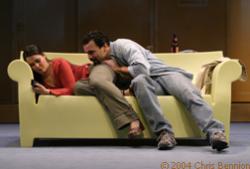Playwright Lisa Loomer ambitiously explores issues of class, race, and parenthood in Living Out, a funny, insightful, and ultimately heart-wrenching play that's the best of the Rep's current season to date.
Illegal Salvadorian immigrant Ana (Stephanie Diaz) takes a job as a "live-out" nanny to the newborn child of up-and-coming L.A. attorney Nancy (Julie Briskman). Both women are well-educated, have supportive (if rather clueless) husbands, and want to be good parents. They also both tend to be less-than-honest with their employers in order to keep their jobs and move on up: Ana neglects to inform Nancy about her son's citizenship status; Nancy fibs to her hardass (and childless-by-choice) boss when Ana needs to take time off.
I can hardly relate to either of these characters' life scenarios, but I still loved Living Out for its compelling story, gorgeous dialogue, and mesmerizing energy. What must it be like to leave your children in another country, only to move abroad and take care of someone else's? Is there really a "better life" in the U.S. during these current (hateful, fearful) times? These issues are part of many people's daily lives, and Loomer's compassionate work really got me thinking about them.
This is a play about connection, after all. Director Sharon Ott's brilliant staging (via excellent scenic design work by Matthew Smucker) allows the characters to weave in and out of the same spaces, suggesting kinship and semblance; every wealthy white character has a working-class non-white correlative. It's a fantastic balance.
Acting is pretty much top-notch across the board, but two performances deserve special attention. Liz McCarthy shimmers as wealthy mom Wallace Breyer, flavoring her racism-tinged dialogue with a beautifully comic so-wrong-it's-funny uppitiness; she's like a less shrill Karen Walker. As her maid (and counterpart) Zoila, Maria Elena Ramirez is an absolute powerhouse of spry, gleeful bitterness. (Definitely no Rosario.) I became instantly happier anytime either of these spectacular performers hit the stage.
But its leads Diaz and Briskman serve as able anchors for the play's whirling action. The devastating final scene leaves their characters only slightly removed from their starting points: connected, but terribly far apart.
